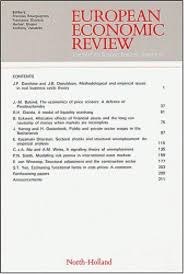
Beetsma, R., Debrun, X. and Sloof, R. (2022). The political economy of fiscal transparency and independent fiscal councils European Economic Review, 145:.
-
Affiliated authors
-
Publication year2022
-
JournalEuropean Economic Review
This paper develops a theory of fiscal transparency aimed at highlighting the potential contribution of independent fiscal councils to fiscal responsibility. In a political economy model with electoral competition, voters care about the candidates{\textquoteright} competence to supply valuable public goods and about their congruence (subjective sense of proximity). Voters observe candidates{\textquoteright} congruence but must form views about their competence based on the expected amount of public goods they could provide, and on other random signs about competence, public debt and the state of the economy. More transparency reduces noise around these relevant considerations. The model exhibits a bias towards excessive public debt for both “partisan” (myopia) and “opportunistic” (signaling competence through additional spending) motives so that institutional arrangements mitigating the debt bias carry welfare gains. While transparency about public debt itself is irrelevant, clearer signals about competence raise public debt if the incumbent enjoys a sufficiently large electoral advantage but reduce debt otherwise. Increased transparency about the state of the economy raises debt and is less valued by voters and the incumbent than greater transparency about competence. The latter is preferred by all players if the incumbent does not hold too large an electoral advantage. Otherwise, the incumbent and the public may have diverging preferences regarding greater transparency. Our analysis reveals the ambiguity about the potential contribution of independent fiscal councils (IFCs) to fiscal responsibility through increased transparency, and points to the inherent fragility of the political backing for such institutions.